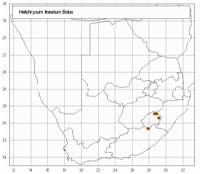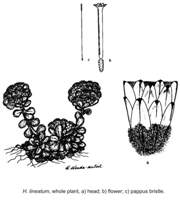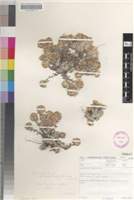Origin of name:
lineatus /-a /-um = with lengthwise stripes; striped with parallel lines.
Diagnostic characters:
Mat-forming, grey tuftsUpper leaves forming a rosette below the inflorescenceMedium-sized headsCompact inflorescence
Description:
Profusely branched perennial herb forming mats up to 200 mm across, or tufted, stems prostrate or decumbent, very slender, greyish-white felted, sparsely to closely leafy. Leaves imbricate with woolly-backed oblong bases as long as the blade webbed to the stem, blades mostly 4-10 x 3-7 mm, elliptic-oblong to oblong-spathulate, apex rounded, both surfaces closely greyish-white woolly-felted. Heads homogamous, very rarely heterogamous, cylindric, c. 5 x 2 mm, many clustered at the branch tips closely surrounded by leaves. Involucral bracts in 4 series, soon caducous, outermost short, webbed with wool to 2-3 reduced surrounding leaves, others subequal, about equaling flowers, not radiating, all translucent, upper part light golden-brown, obtuse, extreme tip opaque or subopaque along the midline. Receptacle nearly smooth. Flowers 18-25, very rarely 1 female. Achenes spindle-shaped, c. 1 mm long, glabrous in type material, with duplex hairs in other collections. Pappus bristles many, about equaling corolla, delicate, scabrid, bases cohering lightly by patent cilia.
Distribution:
Grows in short grassland, then tufted, or on bare earth, then forming small mats. Endemic to the high mountains in Lesotho and the Drakensberg on the Cape-Lesotho and KwaZulu-Natal-Lesotho borders, c. 2 700-3 200 m. Colonizing disturbed gravel areas.
Grassland Biome.
Notes:
Rarely collected but common where it occurs.
Taxonomy:
Literature:
Helichrysum lineatum H. Bol. In Trans. S. Afr. phil. Soc. 18, 3: 386 (1907).
Type:
Eastern Cape, Barkly East distr., Drakensberg, Doodman's Krans Mtn., 9 000 ft, 8 iii 1904, Galpin 6669 (BOL, holo.; K; NH, iso.).
Synonym(s):
Vouchers:
Jacot Guillarmod 2083 (PRE); Hilliard & Burtt 8780 (E; NU); Koekemoer 2895 (PRE).


